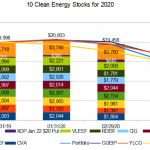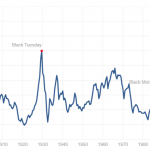My #1 Rule of Investing
Tom Konrad CFA Rules of Investing Warren Buffett says "The first rule of Investing is don't lose money; the second rule is don't forget rule #1." Jim Hansen at Ravenna Capital Management and publisher of the Master Resource Report about oil and other energy news has a "prime directive" (a la Star Trek) about oil prognostication which is "never predict prices." These rules have to be taken metaphorically, not literally. Buffett's rule is too general to be useful. I take his message to mean that care to avoid losses is more effective than...
State of the Union Address: Alt Energy Sectors and Stocks to Watch
So it came and went, the much anticipated State of the Union Address. While the pundits will inevitably focus the bulk of their attention and commentary on the Iraq question, there were undoubtedly some very interesting nuggets of alt energy info in that speech. Above all things, one crucial variable has changed from a year ago: Congress is now controlled by the Democrats and already the slew of alt energy and climate change proposals brought forth by various senators leads one to believe that, as far as the federal government is concerned, 07' should see more than just...
An Elephant Hunter Explains Inflection Point Investing
John Petersen In "An Elephant Hunter Explains Market Dynamics" I discussed the two basic types of public companies; earnings-driven companies that are “bought” in top-tier weighing machine markets and event-driven companies that are “sold” in lower-tier voting machine markets. Today I'll get a bit more granular and show how "sold" companies usually fall into one of two discrete sub-classes that have a major impact on their stock market valuations. As a starting point, I'll ignore the China-based companies that are listed in the US because their quirky metrics would only confuse the analysis. Then I'll break...
The Short Side of Clean Energy
Green Energy Investing For Experts, Part I Tom Konrad, CFA You don't have to be long Renewable Energy stocks to have a green portfolio. Shorting, selling calls, or buying puts on companies and industries which are heavily dependent on dirty and finite fossil fuels not only makes a portfolio greener, it can protect against the effects of a permanent global decline caused by peak oil. Nate Hagens presented this slide at the 2009 International Peak Oil Conference: It shows his conception of the different schools of thought among those of us who understand peak oil. Those represented in...
Short Demand for Cree High and Rising
I got a call from my broker this morning asking me if I'd be willing to loan out my shares of Cree, Inc. (NASD:CREE) to a short seller. Since the only cost to me is that I will not be able to vote my shares, and I will earn 2.5% per annum on the value, I said "yes." Normally, brokerages get the shares they lend out to shorts from margin accounts with a margin balance. Since I never carry a balance (although I do have a margin account in order to trade options) they must ask my permission...
The Trump Trade
by Garvin Jabusch The first two weeks under the Trump administration have been a shock to the system. With the change in administration, how will you approach your stock portfolio(s)? For starters, your fundamentals should remain unchanged. For me, that means looking for great companies in expanding markets that are enabling long-term economic growth, and reducing systemic risks. Of course, this also means buying these stocks at low valuations. Benjamin Graham and Warren Buffett were right about ‘wonderful companies at fair prices.’ That is never going to change. With that said, let’s look at what has changed and...
Ten Clean Energy Stocks for 2020: Trades
by Tom Konrad Ph.D., CFA
Four weeks ago, I predicted that the 12% market correction we had seen would turn into a true bear market. Bear markets are often defined as a decline of more than 20% for the major market indexes, but I find it more useful to focus on long term changes in investor sentiment.
What I did not predict was just how severe the effect of the coronovirus shutdown would be on the economy. I thought we would need the combined of the effect of the shutdown and investors re-assessing their risk tolerance to bring us into full...
Should I Sell My Mutual Fund To Go Solar?
by Tom Konrad Ph.D., CFA An enthusiastic solar volunteer recently asked me: “What can I invest in to prepare for the next financial crisis?” The situation made the question deeply ironic. The woman asking me was trying to help people invest in solar systems through Solarize, a nonprofit, community-sponsored group buying and discount program. Our town of Marbletown, New York and the neighboring towns of Rochester and Olive have just launched Solarize Rondout Valley, a campaign open to residential and commercial building owners in Ulster County. Solarize campaigns are designed to make it easier and cheaper...
Green Energy Investing For Beginners: How Many Stocks Should You Own?
Tom Konrad, CFA In stock portfolios, deciding how many stocks to own involves weighing a trade off. A smaller portfolio can be built (and sold) with fewer commissions, and also requires less time to research. On the other hand, a portfolio with fewer stocks will gain fewer benefits of diversification, and likely be both more volatile and harder to sell in a crisis. These trade offs are also affected by the size of the portfolio, and the market capitalization and liquidity of the companies in the portfolio. Diversification is widely accepted as a nearly costless way to reduce...
Do You Need To Invest In Oil To Benefit From Expensive Oil?
Two months ago, Tom told us how he'd dipped a toe into the black stuff (i.e. bought the OIL etf) on grounds that current supply destruction related to the depressed price of crude oil would eventually lead to the same kind of supply-demand crunch that led oil to spike during the 2004 to mid-2008 period. If you need evidence that the current price of crude is wreaking havoc in the world of oil & gas exploration, look no further than Alberta and its oil sands. The oil sands contain the second largest oil reserves in the world after...
The Problem With Proxy Ballots
Vote With Money Instead by Garvin Jabusch Many people assume that engagement with public companies through proxy voting and resolution filing is the best if not only way to see positive environmental, social, and governance outcomes from your investments. For me, this approach misses a fundamental point of market-based solutions: you make in investments in the most compelling ideas that reflect what you think is likely to grow, where you think the economy is headed, and yes, outcomes you support. That means using investments to favor firms that are already making innovative sustainable contributions to the global economy...
The Big Short and Picking a Money Manager
If you're going to have someone else manage your money, consider their incentives carefully. I just finished reading Micheal Lewis's excellent book The Big Short: Inside the Doomsday Machine on the Wall Street's role in the subprime mortgage meltdown and the few investors who saw it coming. I began with a low opinion of the effectiveness of the vast majority fund managers and advisors who manage other people's money for a living, but the the highly-paid gross negligence and/or incompetence of the people running the CDO operations of the big Wall Street banks in the years leading...
Green Energy Investing For Beginners, Part I: Stocks, Mutual Funds, or ETFs
Tom Konrad CFA Investing in green energy can be good for both the climate and your wallet. How good depends on choosing the right investment vehicles (mutual funds, ETFs, or stocks) and sectors to invest in. This will get you started. More and more investors are investing in green energy. According to the Cleantech Group, the Cleantech sector is now the largest sector for venture capital investment. Green Energy is not just for venture capitalists. Small investors have done well in 2009. Since the market bottomed at the start of March, the average green energy mutual fund topped...
A Year Later: Market Up, Clean Energy Down
Tom Konrad, CFA When I called the peak a year ago, it was too soon for the broad market, but not for clean energy stocks. I think both have room to fall, but clean energy may bottom first. Almost a year ago at the start of June, I wrote saying "we're near the peak" of the stock market. I was too early, and admitted it in August. But I also said that it was a bad time to be in the market: the risks of a decline far outweighed the potential gains of remaining in an...
Correction, or Bear Market?
by Tom Konrad, Ph.D., CFA
On February 21st, I was helping an investment advisor I consult with pick stocks for a new client's portfolio. He lamented that there were not enough stocks at good valuations. This is one of the hardest parts of being an investment advisor: a client expects the advisor to build a portfolio of stocks which should do well, but sometimes, especially in late stage bull markets, most stocks are overvalued. I reminded him, "The Constitution does not guarantee anyone the right to good stock picks." He agreed, but he still had to tell his client that...
An Elephant Hunter Explains Market Dynamics
John Petersen Friday afternoon was a strange time for Axion Power International (AXPW.OB). After trading 200,000 shares early in the day, Axion filed $28 million mixed shelf registration with the SEC at about one o'clock and the fly on the wall reported the filing within minutes. It seems that some stockholders were spooked by the news and assumed that Axion would sell stock right away instead of waiting for the fall deal season. Their knee-jerk selling shoved another 1.1 million shares into the market in three hours and made Friday the second heaviest trading day in Axion's history....




